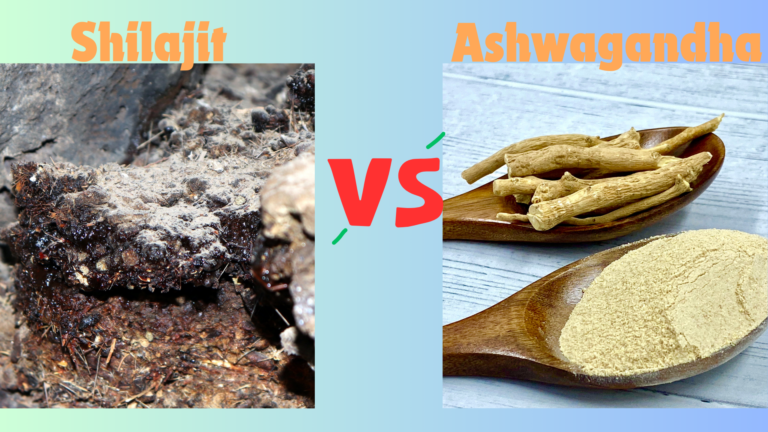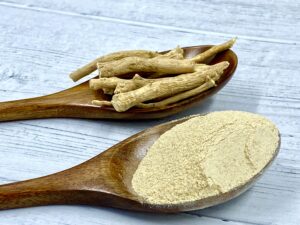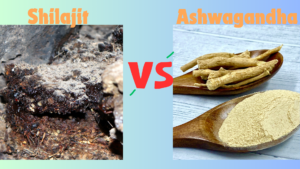Shilajit vs Ashwagandha: Comparison between the two Ayurvedic Remedies 2024

Introduction
Ayurvedic medicines are an ancient healing system of India(Bharat), which has gained popularity worldwide for its natural healing remedies (without any toxins or chemicals)and health benefits. Among the vast array of Ayurvedic herbs and natural(organic) supplements, Shilajit and Ashwagandha stand out for their remarkable health-promoting properties. In this blog post will give you a deeper insight into the benefits, uses, and differences between Shilajit and Ashwagandha, helping you understand which one might be better as per your health needs.
II. What is Shilajit?

Shilajit is a sticky, tar-like substance found mainly in the rocks of the Himalayas. As a powerful rejuvenator and favorable agent, Shilajit has been known and used in Ayurvedic medicine for centuries. It is formed over centuries by the gradual decomposition of certain plants by microorganisms.
The Most Common Traditional Uses in Ayurveda:
Shilajit is traditionally used to improve cognitive function, enhance energy, and promote overall vitality and well-being for the body.
Key Components and Nutritional Profile:
Shilajit contains over 84 minerals, including humic acid, fulvic acid, and a variety of trace elements. These components are believed and has given contribution to its numerous health benefits.
III. What is Ashwagandha?

Ashwagandha, also known as Withania somnifera or Indian ginseng, is a small shrub along with yellow flowers. The berries and roots of the plant are mainly used to prepare a popular herbal remedy in Ayurvedic medicine.
Traditional Uses in Ayurveda:
Ashwagandha is traditionally used to reduce stress, improve energy levels, and enhance overall health which will maintain the overall body balance.
Key Components and Nutritional Profile:
Ashwagandha contains several bioactive compounds, some of them include, Withanolides, alkaloids, and choline, which are thought to be responsible for its therapeutic effects.
IV. Health Benefits of Shilajit
- Energy and Stamina Enhancement: Shilajit is renowned for its ability to boost energy levels and increase stamina. It is very often used by athletes and those looking to improve physical performance that can be some celebrity star, gym trainer, or a muscular body lover who wants to improve his/her physical appearance.
- Cognitive Function and Mental Clarity: The fulvic acid in Shilajit helps support brain health, improving memory, focus, and overall cognitive function.
- Anti-Aging Properties: Shilajit’s antioxidant properties help protect against cellular damage and promote longevity.
- Immune System Support: Shilajit enhances the body’s immune response, helping to fight off infections and illnesses.
- Other Notable Benefits: Shilajit is also known for its role in supporting health of heart, improving gut health, and enhancing nutrient absorption which will help to maintain the body balance properly and effectively.
V. Health Benefits of Ashwagandha


- Stress and Anxiety Reduction: Ashwagandha is an adaptogen, i.e. it helps the body manage stress. It is particularly most effective in reducing cortisol levels, which is the body’s primary stress hormone.
- Improved Sleep Quality: Many people use Ashwagandha to improve sleep quality and reduce insomnia.
- Enhanced Athletic Performance: Ashwagandha helps increase muscle mass and strength, making it a popular supplement among athletes, gym freaks, and some celebs.
- Hormonal Balance and Reproductive Health: Ashwagandha supports hormonal balance, which can be beneficial for both men and women’s reproductive health.
- Other Notable Benefits: It is also known for its anti-inflammatory properties, ability to improve thyroid function, and support for heart health also.
Summary– Ashwagandha, another powerful adaptogen, offers a dual benefit of suppressing cortisol levels and potentially increasing testosterone. This makes it an invaluable tool for managing stress and enhancing physical performance. However, it’s crucial to cycle Ashwagandha after prolonged use to prevent any potential tapering effects on norepinephrine, a key neurochemical responsible for energy generation.
VI. Comparing Shilajit and Ashwagandha

- Differences in Composition and Effects: Where Shilajit is a mineral-rich resin, whereas Ashwagandha is an herb. Their effects on the body differ due to their unique and perfect compositions. Shilajit is mainly focused on energy, stamina, and overall rejuvenation, while Ashwagandha primarily targets stress reduction, improved sleep, and overall hormonal balance.
- Specific Health Conditions Each Supplement Addresses: Shilajit is often used for enhancing physical performance, cognitive function, and anti-aging, whereas, Ashwagandha is preferred for stress management, anxiety reduction, and improving sleep quality.
- Synergistic Use: Can They Be Taken Together?: Yes, Shilajit and Ashwagandha can be taken together. The complementary effects of both Shilajit and Ashwagandha can provide a balanced approach to your overall health and well-being, combining the energy and vitality with stress reduction and improved sleep.
VII. Potential Side Effects and Precautions
- Common Side Effects of Shilajit: Some people may experience allergic reactions, increased iron levels, or digestive issues. It is crucial to use purified Shilajit to avoid contamination.
- Common Side Effects of Ashwagandha: Possible side effects include digestive upset, headaches, and drowsiness. It is important to start with a lower dose to gauge tolerance.
- Who Should Avoid These Supplements? : Pregnant or breastfeeding women, individuals with autoimmune diseases, or those on specific medications should consult a healthcare provider before using these supplements.
VIII. Dosage and How to Use
- Recommended Dosages for Shilajit: The typical dosage ranges from 300 to 500 mg per day. It is often taken in the morning or before physical activity.
- Recommended Dosages for Ashwagandha: The common dosage ranges from 300 to 600 mg per day, often divided into two doses.
- Forms Available (Powder, Capsules, Tinctures): Both supplements are available in various forms, including powders, capsules, and tinctures. Choose the form that best suits your lifestyle and preference.
- Tips for Incorporating Them into Your Daily Routine: Take Shilajit with warm water or milk for better absorption. Ashwagandha can be taken with meals or before bedtime to enhance sleep quality.
IX. User Experiences and Testimonials
- Anecdotal Evidence and Personal Stories: Many users report increased energy, reduced stress, and improved overall well-being from using Shilajit and Ashwagandha.
- Scientific Studies and Clinical Trials: Numerous studies support the benefits of both supplements. For example, a study published in the Journal of Ethnopharmacology found that Shilajit significantly improved physical performance, while another study in the Indian Journal of Psychological Medicine highlighted Ashwagandha’s stress-reducing properties.
- Expert Opinions: Health professionals and Ayurvedic practitioners often recommend these supplements for their well-documented health benefits.
X. Conclusion
In this Blog of comparison of Shilajit vs Ashwagandha we have discussed unique and powerful health benefits, making them valuable additions to your daily wellness routine. Shilajit is ideal for those seeking increased energy, stamina, and cognitive function, while Ashwagandha excels in reducing stress, improving sleep, and balancing hormones. Consider your specific health goals and consult with a healthcare provider to determine which supplement is best for you.
XI. References
READ MORE INFORMATIVE AND EDUCATIONAL BLOGS HERE:
https://unveileducationalinsights.com/blogs/
Our Social Media Handles



Addressing Controversies Surrounding NEET 2024: Insights from the Ministry of Education

“How to Create Interest in Maths: Unlocking the Magic of Numbers”



Thanks for the explaining this much deep